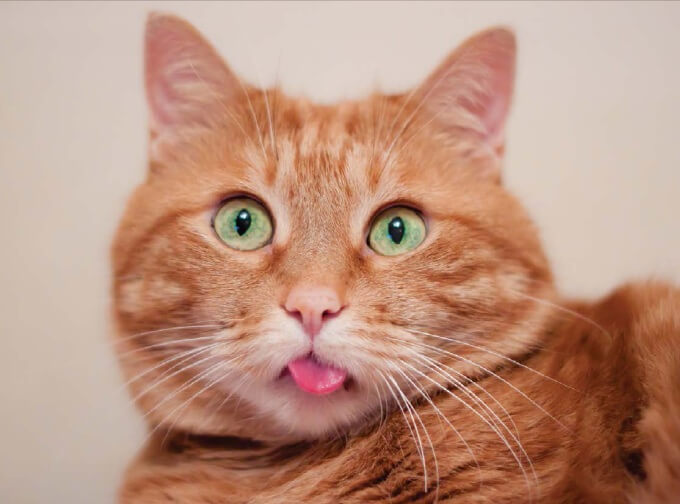You sit comfortably on the sofa, the comfortably slumbering cat on your lap. Suddenly the cat rises and bares its teeth to yawn heartily. Wait a minute – what smells so strange here? Most people know that it is not only in older cats that cat breath is not the smell of roses. But if your animal roommate smells noticeably bad from the mouth, this can have harmless but also serious causes. We explain why some cats get bad breath.
Harmless causes of bad breath in cats

First, let’s look at the innocuous causes of smelly breath. If the little predator ate a tuna meal five minutes ago, we need not be surprised: intensely smelling cat food remains as a scent for a while after it has been in the cat. There are other possible harmless causes of bad cat breath.
Tooth or gum problems
So small, so cute – and a little smelly? Young cats change their teeth between four and seven months of age: the milk teeth disappear and the permanent pearly whites grow. At this stage, inflammation in the gums is possible, causing bad breath. Often the smell will dissipate after a short time and the inflammation will subside. If this bad breath persists beyond the change of teeth, a visit to the vet is advisable.
Bad breath from cat food
Food is the leading cause of bad breath. We all know that there are foods that lead to bad breath faster than we would like. Before going on a date, if we’re hungry for a snack, we’re more likely to reach for an apple than a kebab. In cats, food also affects how they smell their mouths. Fish meals such as tuna make the cat smell heavier for a while. This also applies to less high-quality feed types. See for yourself: Open a can of wet food with a lot of by-products and grain and at the same time a high-quality cat food with a lot of meat. You will find better content, better smell.
Bad breath as a sign of illness
If your cat is already an adult and the breath suddenly smells intensely from its mouth, you should observe the cat more closely. Bad breath is often a sign of illness. There may be cause for concern.
Tartar: Bad breath and drooling
Cats suffer from tooth decay less than humans, but many have tartar. It occurs when bacteria in the mouth convert the carbohydrates in food to sugar. Little by little, these microbial deposits stick to the tooth. We call these deposits plaque. Plaque creates tartar, which can expand to under the visible part of the teeth. At this point in time at the latest, the cat’s breath begins to smell unpleasant. Cats with dental problems often show other symptoms such as one-sided chewing, drooling, and reduced food intake despite being hungry. Often they are already suffering from pain without our noticing anything. Over time, tartar can cause inflammation throughout the body.
Diabetes: The cat has bad breath and drinks a lot
A sweet smell from the mouth is a potential symptom of hypoglycemia. With diabetes, the cat’s body is no longer able to process sugar using insulin. In this case, he does not get enough energy and uses proteins and fats to make up for the lack of accessible carbohydrates. We call the resulting fatty acids ketones. They consist, among other things, of acetone and leave the body through the air they breathe and the urine of the sick cat. They give off a sweet, putrid smell that smells of fermented fruit or even chemically like nail polish remover. If the cat drinks more than usual at the same time, these are signs that can speak of diabetes.
Kidney disease: acidic breath in the cat
Similar to diabetes, cats with kidney failure tend to drink more and have an unpleasant smell in their mouths. In addition, the cats appear dehydrated. You can check this by pulling up a fold of skin in the neck area: In the case of dehydrated animals, the skin folds only slowly recede. As the kidneys stop working properly, more and more toxins build up in the body. In the advanced stages of kidney disease, cats are more likely to feel nauseous, vomit, or have an unpleasant smell from their mouths. The odor is reminiscent of urine, as the cat exhales ammonia, which the kidneys can no longer adequately filter.
Putrid or fishy bad breath in cats
There can be other diseases behind bad breath in cats. They are less common than those already described. Breath that smells like fish is a possible sign of liver or gastrointestinal tract disease. If the velvet paw develops an intense mouth odor, a strong worm infestation is possible. But speculation is out of place in these cases. If you do not know the cause of the bad breath, you should see a veterinarian.

